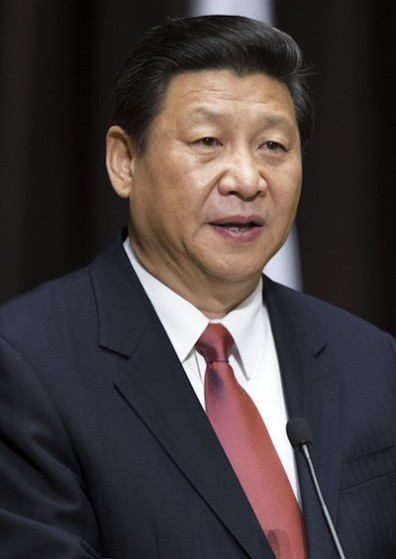Xi Jinping: Smooth Talker vs. Brass-Knuckle Operator
China’s president talks high-mindedly about economic globalization. Sounds good, until you see his latest global export strategy – tools for human control.

Chinese President Xi Jinping (Credit: Kaliva - Shutterstock.com)
Takeaways
- For all the smooth words Xi Jinping spoke about responsible globalization in Davos in 2017, we haven’t seen much positive action.
- China’s offer to autocrats elsewhere is: Let us penetrate your country’s IT infrastructure and media to control the flow of information and better control dissent.
- What is ironic about China’s leaders’ efforts to support other autocrats globally is that it puts the CCP in direct conflict with its own genesis.
Exactly two years ago, in his first appearance before the World Economic Forum in Davos, China’s President Xi Jinping created a global splash when he presented himself as “Mr. Global Responsibility” in his strong defense of economic globalization.
As Xi emphasized then:
Economic globalization has created new problems. But this is no justification to write off economic globalization altogether. Rather we should adapt to and guide globalization, cushion its negative impact and deliver its benefits to all countries and all nations.
As he added then, “the global economy is the big ocean you cannot escape from” and China, said Xi, had “learned how to swim.”
Of course, these two sentences can also be understood as an outright threat – in the sense that no nation and no person on earth should believe that he or she can escape the Chinese export machine.
Since that moment, the world community has been waiting for how Xi would exactly follow up on his noble-sounding principles and intentions. To date, for all the very smooth words Xi spoke in his January 2017 maiden speech in Davos, we haven’t seen much.
“Mr. Responsibility” takes the world for a ride
However, where China under Xi’s management has strongly shown its hand in the meantime is in the arena of global human rights. But that has not occurred in a manner that would seem in any way compatible with the noble and high-minded Xi in the Davos 2017 edition.
Instead, operating in a rather brass knuckle manner, as James Dorsey has detailed, China is leading the charge to undermine universally accepted concepts of human rights, accountability and justice, evidently to create a brand of human rights with some very ”Chinese characteristics.”
A key part of that Chinese campaign, as Freedom House has credibly detailed, is to provide a tantalizing offer to dictators and autocrats elsewhere: Let us help you by allowing us to penetrate your country’s IT infrastructure as well as the media sector to control the flow of information and better control dissent.
If anything, this is a very peculiar, in fact poisonous way for China to invest and apply the monetary and technological fruits it has so eagerly collected from the process of economic globalization.
A tantalizing offer for other autocrats
Making these technologies an item on China’s global export agenda is, of course, a tit-for-tat replay of the tools and strategies which Chinese leaders use so successfully and perniciously in their home society.
One must wonder whether creating an export market for such human control technologies is the responsible form of economic globalization that Mr. Xi really had in the back of his mind when he impressed – and stunned – pretty much everybody with his smooth operator speech two years ago in Davos.
Despite the clearly attached Chinese strings that come along with such an offer, the reason why the Chinese can have their way is self-evident: Autocrats everywhere have a strong desire to control their peoples as closely and effectively as possible.
Betraying the CCP’s own roots
What is especially ironic about the contemporary efforts by China’s leaders to support other autocrats globally is that this control-freak strategy, intended to oppress popular dissent harshly and systematically by “virtue” of mind control, puts the CCP in direct conflict with its own genesis.
It sprang up in the 1940s from a determined revolutionary movement that sought to respond to, if not foment, popular protests and a high degree of popular dissatisfaction with the country’s economy and politics at the time.
But that insight is just about the last thing that the smooth-talking and always suave-looking Xi Jinping would ever worry about. That’s just not part of the CCP brand of “Chinese characteristics.”



























